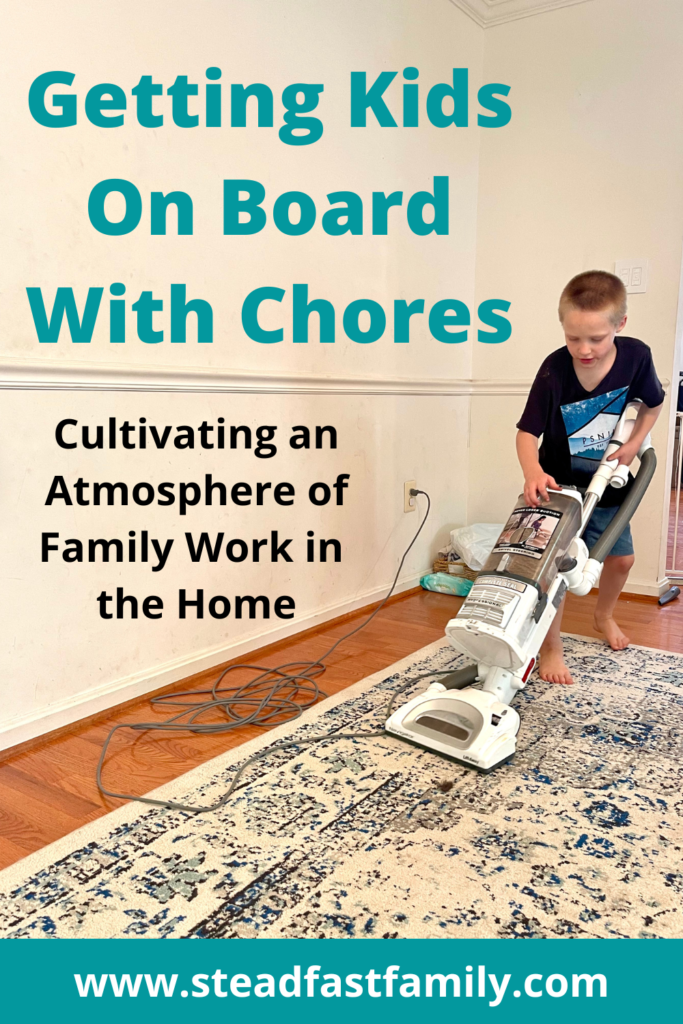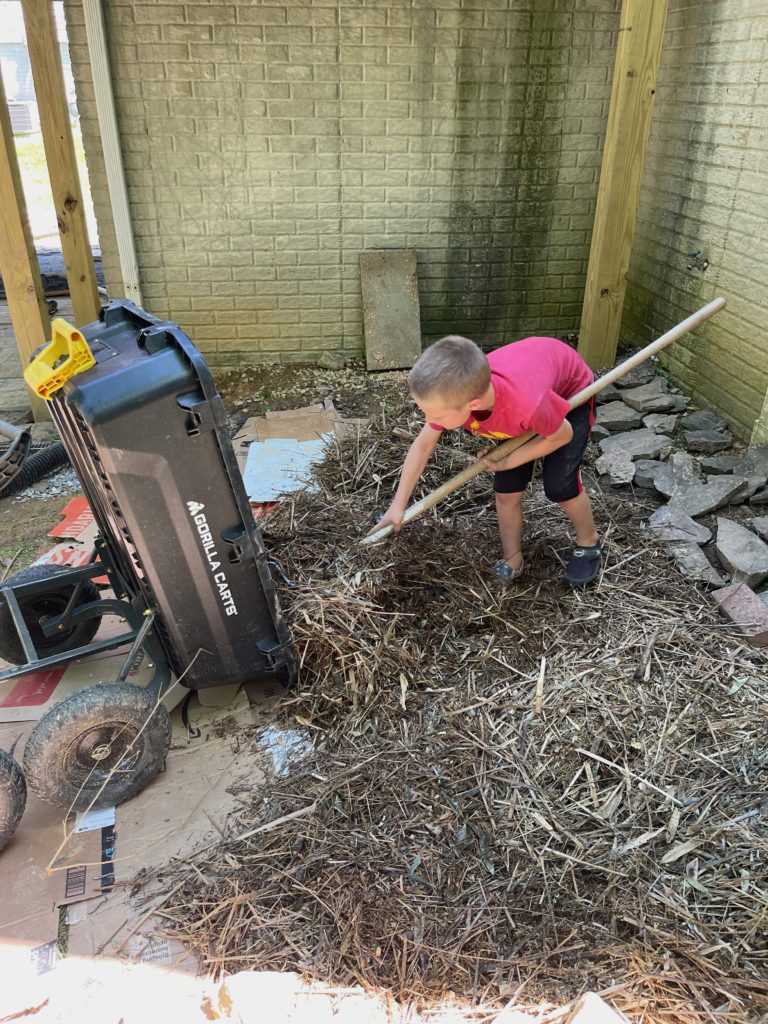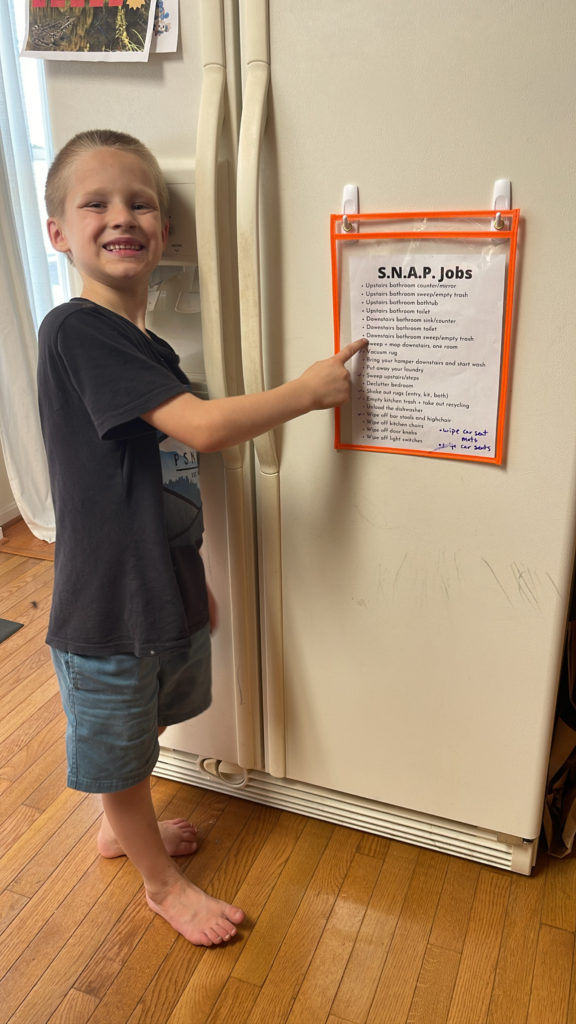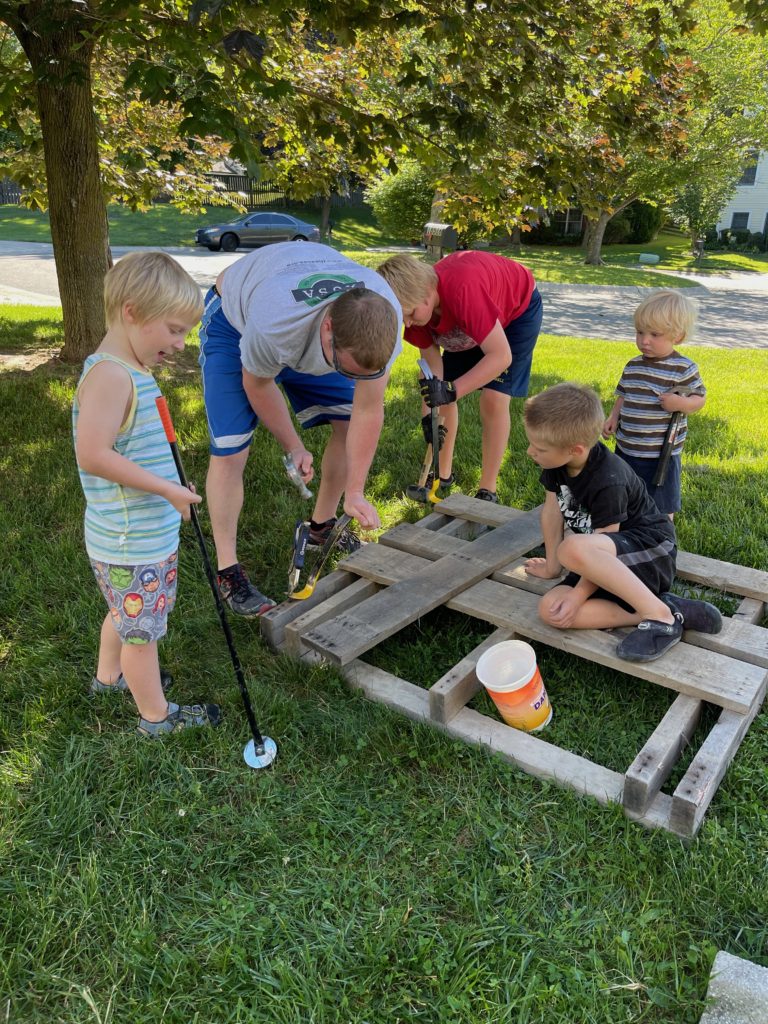Getting Kids On Board With Chores: Cultivating an Atmosphere of Family Work in the Home
If you already have a perfectly running chore system set up with your kids, this post might not be for you. However, if you, like me, have struggled to get everyone in the family sharing the load of routine home maintenance, often running yourself weary in the process, then I hope this post will give you some fresh inspiration and ideas!
The place to begin
When it comes to chores, like with many other areas of parenting, I find the best place to start isn’t in running off to Pinterest in search of ideas and printables. No, the best place to begin is always with me. With my own heart and attitude and behaviors.
So I ask myself…
- What is my own attitude towards work? Do I grumble and complain, even if it is only inside of my own head and heart?
- Do I have a proper understanding of work and rest?
- What example am I setting?
- Am I being consistent and loving in my communication expectations of my children?
In our world, work is often looked at in one of two extremes. Either you have a “hustle mindset” and you fall into the trap of overworking or work is looked at as something you do the bare minimum of so you can live your “real life” of leisure. A Christian worldview rejects both and offers a third way.
In Genesis, work is something that exists before the fall. It’s good! Yes, after the fall work becomes much more difficult and does not always automatically bear the fruit of our labor. However, work itself is still something that is good and ordained by God. Even more so, in Colossians 3:23 we are told that whatever we do we should work with all our hearts, as though we are working directly for the Lord himself. Our work is good, valuable, and with the right heart attitude is honoring to God.
On the flip side, we do not need to strive in our work. Independent of the work we do we are already fully loved and justified before God. Our work does not make us better in his eyes. Whether we finish every task on our to do list has no bearing on our worth before him. Instead, Christ is our perfect and ultimate resting place. This rest can follow us even as we work and also means we should include rhythms of rest in our lives. It is out of this rest, and not out of striving, that we do our work.
You might be wondering, this is all great, but what does it have to do with getting my kids to do their chores?!
In Deuteronomy 6:5-7 it says:
“You shall love the LORD your God with all your heart and with all your soul and with all your might. And these words that I command you today shall be on your heart. You shall teach them diligently to your children, and shall talk of them when you sit in your house, and when you walk by the way, and when you lie down, and when you rise.”
One of the biggest things this passage has taught me is that leading my children starts with my own heart. It starts with “YOU shall love the Lord” and “these words shall be on YOUR heart.” This love for God and his words isn’t just something we read about in the Bible, it is something that penetrates every area of our lives. So when we lead our children – whether its chores, or learning, or friendships, or anything else – we cannot lead them well somewhere that God has not brought our hearts first.
So how does this translate into helping our kids?
As with many areas of life and parenting, our own thoughts, attitudes, and behaviors set the atmosphere of our home. Our kids are internalizing this atmosphere day in and day out, whether we intend for them to or not. But how can we be intentional about guiding our kids in this area? By casting the vision.
Here’s the thing, like 90% of the daily work we need to do keep our homes running is, let’s be honest, kind of boring and monotonous. #truth 😂 It can be hard enough for us as adults to keep a positive attitude about it, let alone our kids (especially if you have kids like mine with ADHD who really struggle with being motivated to do things that are boring). We have to explicitly instruct them as to the reasons behind why we have to do this work.
To that effect, here are 3 things that my boys hear me say over and over again:
- “We want to be good stewards of the things God has given us.” These blessings – our house, our clothes, our pet, our toys, etc – they come from God. We honor God and show our thanks when we take good care of what he has given us.
- “These things are necessary.” If no one unloads and loads the dishwasher, we eventually won’t have any dishes to eat off of. If you don’t put your dirty clothes in your hamper and take them to the wash, eventually you will have no clothes to wear. So many things just must be done. And if they must be done, does it serve us well to have a bad attitude about them? Of course not! So instead, lets turn on some upbeat music and just get done what needs to be done!
- “We can praise God even when we do these things.” This kind of ties into point 1, but also deserves its own comment. “So whether you eat or drink or whatever you do, do it all for the glory of God.” (1 Cor 10:31) In all that we do, we can glorify God through our actions. We can thank and praise him in it all.
These three things are the foundation of our attitudes on work in the home. In fact, we even named our “chore” time after them: S.N.A.P.
S – Stewardship
N – Necessities
And
P – Praise
Every afternoon, the kids know that it’s time to do their “SNAP jobs.” And because of this training, they always work hard and with joyful hearts. Ha! Just kidding. We are all still works in process, but having this underlying philosophy to keep falling back on definitely helps!
Stay positive!
One final aspect of casting the vision also includes being “positive future focused.”
That means changing:
“we need to clean up the mess we just made”
to
“let’s reset this room so it will be ready for us tomorrow morning!”
Or:
“I bet your room will feel a lot more peaceful and enjoyable once we clean it up.”
Or even:
“If we all work together to do these things every day, mom won’t have as much to do by herself and we can do more fun things together!” 🙌 🙌
You are the leader of your family. Instead of just going through the motions of doing routine work, try casting a vision! Does having this vision make everything run perfectly smooth with absolutely no whining or complaining? Of course not. But you’ll be headed in the right direction, and leading your kids along the way.
Troubleshooting chore time woes
If you ever feel stuck when it comes to chores, like no matter what chart or system you try it doesn’t quite work, then this section is for you!
I think a big part of the reason we get stuck with having our kids help with routine chores is we try to copy and paste whatever neat system we see floating around on the internet, or do things exactly like a friend.
However each of our families is unique!
We are made up of individuals with different personalities and together we build our specific family culture. In my experience, not accounting for that and just trying to do exactly what I see someone else do is a recipe for disaster! Instead, it is a much better practice to be inspired by what you see others do and use it for ideas to tweak for your unique circumstance and season of life.
That said, sometimes it’s not that we even need a shiny new system, it’s that we need to troubleshoot more specifically what is causing issues. Once you find that specific problem, it can be solved a lot more easily!
Now, I want to share some problems and solutions I’ve come across, hopefully to inspire you and give you some ideas for solving the problems you and your family are facing when it comes to working together!
#1 Everything relies on you
If you are having a hard time sticking to any type of chore routine or system, this might be the heart of the problem.
For me, I’ve found if our plan relies too much on my oversight, it is a lot more likely to fail. As the main person keeping the household running smoothly, I have a ton on my plate, and I’m sure you do too. If the system I am using is too complicated or I don’t have the buy in from my kids I need and I am the sole motivator… it’s going to suffer any time I am just too busy that day, not to mention days I am not feeling well.
When it comes to my older kids, making sure we had a system where they could follow through with little to no input from me was the #1 thing that has helped us be more consistent.
Now, if you just have young children who cannot work independently, take heart! You are in the training ground! I still have a couple there too. Those are hard years, but the work you do is so worthwhile! For me, with the five and under crowd I find it simplest to just have a “helper” mindset and have them join me in whatever I’m doing as my “special helper.” Yes, it takes longer and that help isn’t exactly helpful, but it will be someday sooner than you think!
#2 You don’t have any habits
Is your kid’s chore list crazy long? Then it might be time to move some of those tasks to automatic habits.
A long list is overwhelming for anyone, but especially a kid! Separating things out and assigning them as habits attached to a particular part of the day can be very helpful. I’ll give you an example of a habit scenario that really helped us:
My 10 and 7 year olds share a room. This room was consistently getting crazy messy, to the point where I would have to regularly come in and reorganize because the mess was just too much for them to handle. Cleaning their room was a job they were supposed to be doing as part of their chores, but it just wasn’t happening regularly enough. I saw an idea online, got inspired and tweaked it, and now their room is usually tidy every day!
Every morning when they first wake up, they are to do these things: tidy their room, tidy their bathroom, get dressed, brush their teeth, and listen to their devotional. Once they’ve done these things, they have free time until breakfast, where they can do (within reason) whatever they want, including play video games.
These tasks are separated from their afternoon chore time, done every day so they are kept on top of and can be done quickly, and there is a natural reward of extra time if they do them quickly. Because they do this day in and day out it is a firmly engrained habit that I play no part of overseeing. And while their room does need an occasional decluttering, it stays picked up on the regular!
My big advice when it comes to habits is this: keep it as simple as possible and be patient.
Whoever said habits take 30 days to create must not have been a mom of young children. 😂 It can take a long time to get a habit in place and it’s not a linear process – there are lots of starts and stops and starts again. But more than almost anything else, habits and routines are the thing that make such a huge difference!
#3 You are totally overwhelmed
The cause of this can be so many things. Sometimes it just boils down to a temporary season of life where you need to rely extra hard on the Lord’s strength. However, sometimes our overwhelm is also just plain trying to do too much.
I know that I really struggle with knowing what to prioritize and what to let go. I struggle with asking for help and remembering that I am only one human who can’t do everything. This is definitely something that requires a lot of prayer, wisdom, and even asking for insight from trusted counselors and friends. It is so important to do the things that are important to you and your family, and release your grip on the rest.
Sometimes the weight of our own expectations is the heaviest burden we bear, and the polished social media feeds we scroll don’t help!
#4 Your kids are totally overwhelmed
We had been slowly moving towards our perfect chore system for a while, keeping things that worked and leaving behind what didn’t, when I finally made one adjustment that changed everything: I noticed my kid’s overwhelm and solved it.
For the way my kid’s brains work, a task like “clean the bathroom” is vague and overwhelming. It seems like it will take forever. Even if I break the steps down, it feels like too much! So now, our list of jobs is broken down so that each job is specific and takes about 5/10 minutes. Instead of “clean the bathroom” it says “wipe the counter and mirror” or something similar. Instantly better.
Kid’s are like us – they get overwhelmed by the mess and the list. They feel it might take forever to do something even if it really will only take a few minutes. They need our help to set them up for success.
For us, that means: breaking the jobs down into bite sized chunks, keeping their main areas decluttered to an amount that is manageable for them, helping them realize just how long a task takes (we use a timer!), and making sure they are trained on how to do a job before it becomes an independent task.
#5 You rely too much on rewards
In both my research and my experience as a mom of four, I have found rewards not only to be ineffective, but generally undermining the values I am trying to teach.
Namely, that whatever it is we are doing (whether it is chores, school, reading, Bible memory, outside time, etc) is worthy and valuable in and of itself. The task is, in effect, it’s own reward.
Once you impose an artificial reward, the focus moves from that task and onto the reward itself. The flip side of this is when that reward is no longer interesting or good enough, the motivation to do that thing is also lost. In short, rewards just don’t work well – often in the short term, and definitely in the long term.
Because of this, I use them very sparingly and when I do I tend to follow these guidelines:
- I use them for a short duration, often as a kickstart for a habit or to do something fun for a while. For example, this summer we did a reading challenge with prizes to earn. This was just for a bit of fun and isn’t our regular approach to building a love for reading.
- I focus on natural or logical rewards. The example given in our morning routine is an instance of this. If they finish their required work efficiently, they naturally have the ability to do whatever they’d like in their extra time. I also emphasize the natural reward of a job well done, ie “wow doesn’t it feel nice to have this cleaned up, now we can use the room to play a game!” or things like that.
- I “celebrate together” instead of reward individually. Instead of “you did your work, here is a popsicle for a reward” we celebrate the work that we all did together! “Wow we’ve been working hard this morning! Let’s all grab a popsicle and take a break together!”
- I let them choose what they earn. In life there are both things that just have to be done and there are also things we work for because we are trying to earn something. Giving my kids the option to go above and beyond to do extra and then choose what they want to earn puts the reigns in their hands. It also lets them learn what helps them stay motivated, which is a valuable life skill.
I hope some of these examples were helpful to problem solving your own situations, or at least inspired you to find the specific issues you are facing and look for creative solutions.
Our current chore routine
The last thing I want to share is our current chore routine. I say *current* because these things change often. I used to feel bad about constantly changing what we were doing, but now I embrace the freshness that a little new brings. I keep the same basic idea and philosophy, but give things the occasional tweak to keep it interesting. In fact, I’m thinking through some changes right now to better help my five year old who is struggling to cooperate and join in with the chores!
All that to say, here is our current set up:
First thing in the morning my older two have an alarm that *usually* succeeds in waking them. Then, they are to tidy up their room and bathroom, brush their teeth, get dressed, and listen to their devotional. After that, they have free time until breakfast. They highly prize this time before breakfast and school starts, so that motivates them to get their tasks done quickly!
After meals everyone clears their dishes. This is a new habit that isn’t always remembered, but we are getting there!
After lunch is our main chore time! Everyone does 15 minutes of tidying up and then chooses at least one job from a list we keep on the fridge. They can choose to do extra jobs if they would like to earn a reward.
Ever since we established this routine, it has been amazing how much easier it has been to maintain at least a mostly clean and tidy home! It’s not perfect and never will be – but it benefits us all to have at least the main living areas feel calm and peaceful.
In addition to this, our general expectation is that if there is something above and beyond the normal daily maintenance, everyone is going to pitch in and help. Whether is a home renovation project (we’ve done a lot!) or just cleaning to get ready for guests, everyone contributes at the level they are able!
I hope this (long!) post helped you think through how to better approach having your kids do chores. It can often be a difficult part of life, but it is also such a worthwhile thing! And when it is running smoothly everyone in the family benefits!




